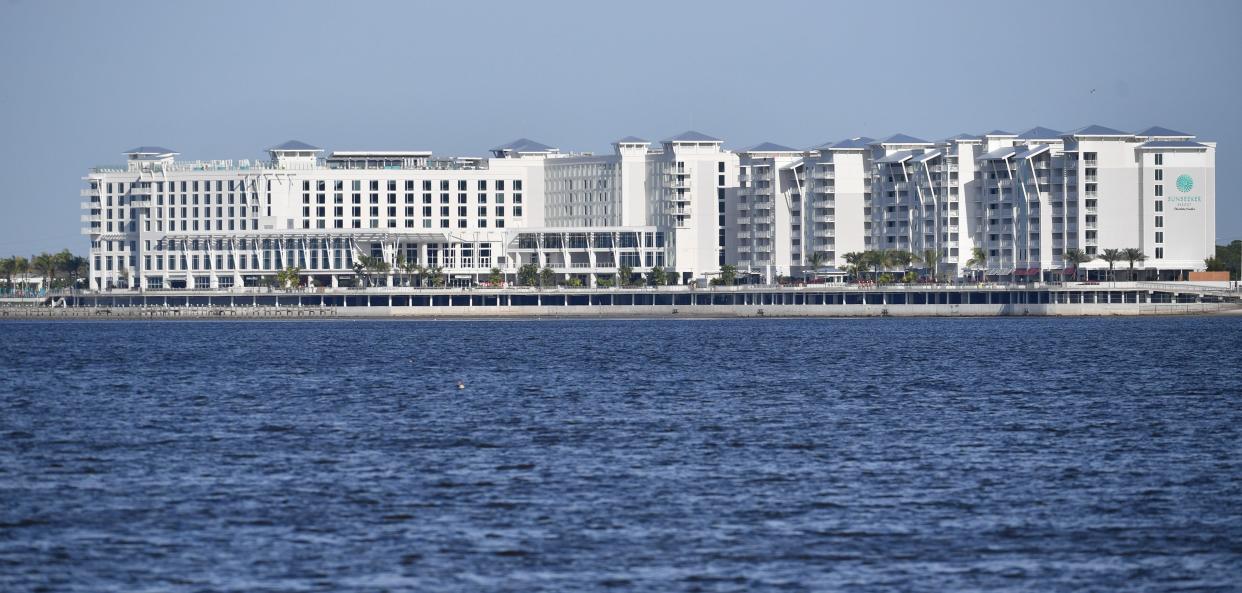Sunseeker must do more to be an eco-friendly neighbor

Sunseeker must be eco-friendly
I recently visited the new Sunseeker Resort. We ate in Harbor Yards and the food was very good.
We ate outside to enjoy the water view, and there was an outside bar near us. I noticed that the bar stocked all plastic glasses and straws, and the restaurants sold bottled water and used plastic utensils. There were also paper and Styrofoam products.
Many people got up from their tables and left the residue of their meals behind, which was poor behavior. It’s breezy there and everything blew around, some of it winding up in Charlotte Harbor.
Write to us: How to send a letter to the editor
Charlotte Harbor is the second-largest estuary in Florida. It is home to many aquatic species that could be damaged by this debris emanating from the resort.
Sunseeker needs to change the products it uses so they will not damage this precious resource. We must protect the wildlife there, which cannot be replaced.
Nancy Ferenacz, Venice
More lung screenings, more lives saved
Lung cancer is the No. 1 cause of cancer death, but there is a screening test that can detect the disease early – and when it is curable.
The more high-risk people we get screened, the more lives will be saved.
Lung cancer screening is intended for people who are at high risk, based on age and smoking history. Not all advising bodies make the same recommendations about who should be screened.
The U.S. Preventive Services Task Force recommends the screening for adults 50 to 80 years old who have a 20-pack-a-year smoking history and currently smoke or quit within the past 15 years.
The Centers for Medicare & Medicaid Services, however, recommends screening only for adults 50 to 77. So, if you are 78, 79 or 80 and have Medicare, Medicaid or a Medicare Replacement Plan, this is not a covered benefit.
I know many people 78 to 80 who are well enough to undergo treatment for early-stage lung cancer. I encourage those who agree to contact the CMS and urge them to reconsider this coverage determination to allow eligibility to the age of 80, mimicking the USPSTF Guidelines.
Contacts are jean.moodywilliams@cms.hhs.gov and/or Shari.Ling@cms.hhs.gov.
Amie J. Miller, Brian D. Jellison Cancer Institute, Sarasota Memorial Hospital
Leaders must stop neglecting Newtown
Thank you for the Jan. 19 guest column by Jetson Grimes, who serves as chairman of the Greater Newtown Redevelopment Corporation.
It is truly appalling that in an affluent community such as Sarasota (or any community, in fact), a neighborhood like Newtown is left without help or resources available to it.
Many of my middle-class neighbors are shocked daily by the excesses afforded to developers and other overindulgences paid for by our taxes.
I beg the powers that be to find ways to strengthen the areas in our community that need help!
Joan Hastings, Sarasota
Food animals cruelly slaughtered
Anyone considering abusing an animal should take note that the State Attorney’s Office vigorously prosecuted and won convictions of the father and daughter who intentionally burned a raccoon, and that it sought a five-year prison sentence for the daughter.
This case begs a question:
Why do we care so much about certain animals yet are indifferent to the suffering of others?
Most states specifically exempt “standard agricultural practices” from their cruelty statutes, no matter how painful the procedure. Animals routinely have body parts severed or mutilated with no anesthesia provided.
Animals raised for food are routinely crammed indoors so tightly they can’t turn around – or, in the case of chickens, spread a wing.
The Humane Methods of Slaughter Act doesn’t apply to birds, which represent 98% of the land animals slaughtered for food. Countless sentient beings are hacked apart while fully conscious or scalded alive.
Most people would never inflict such abuse on an animal, yet they are apparently comfortable paying others to do it for them.
We should always keep in mind this observation by Jane Goodall, the renowned primatologist and animal activist: “Farm animals feel pleasure and sadness, excitement and resentment, depression, fear and pain. They are far more aware and intelligent than we ever imagined.”
Stewart David, Venice
US must push for ceasefire
The article “Death toll in Gaza war surpasses 25,000 " (Jan. 22) described the massive death and destruction being inflicted on Palestinians and their property in the Gaza Strip by Israeli bombs and missiles supplied by the Biden administration.
U.S. support for Israel during this conflict has not only isolated our country from the rest of the world, but it also threatens to drag us into another disastrous war in the Middle East.
America needs to give Israel an ultimatum: Either agree immediately to a cease-fire in Gaza and a two-state peace process or the U.S. ends all financial, military and diplomatic aid to Israel.
Ray Gordon, Venice
This article originally appeared on Sarasota Herald-Tribune: Sunseeker Resort must prove it will be an eco-friendly neighbor

